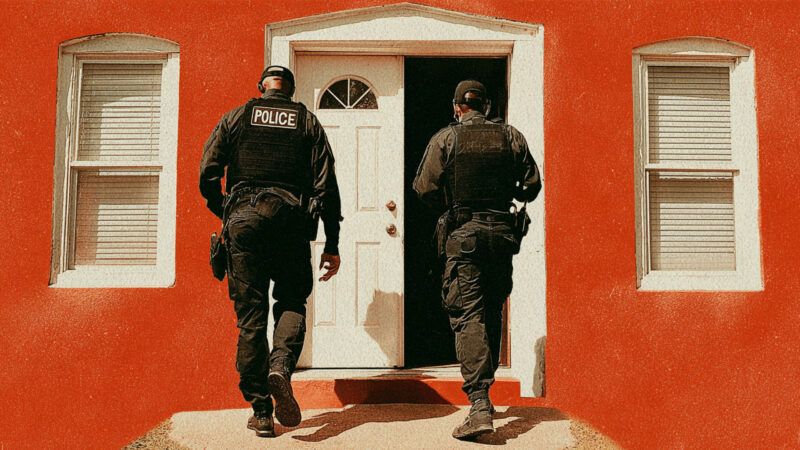Can Police Enter Your Home Without a Warrant? The Supreme Court Will Soon Decide.
Even well-intentioned “community caretaking” can’t justify ignoring the Fourth Amendment.

Swatting—a dangerous trend in which pranksters fabricate emergency reports to get SWAT teams or other law enforcement to descend on a victim's home—has had deadly consequences. In 2020, a Tennessee man swatted for refusing to sell his Twitter handle died of a heart attack when heavily armed officers arrived at his house. In 2017, a Kansas man answering police on his front porch was fatally shot after a false report of a hostage situation. Even celebrities aren't immune: twice this year, Gordon Ramsay's Los Angeles home was swatted, most recently by a caller claiming he had shot two men—fortunately, Ramsay was out of the country at the time.
Tragedies like these highlight a critical question: Should a simple call to emergency services be enough to justify sending heavily armed officers into someone's home, or should stricter safeguards be required? The U.S. Supreme Court will weigh in on that issue when it hears Case v. Montana on October 15. Case centers on a Montana Supreme Court ruling allowing police to enter a home without a warrant under a "community caretaking" exception to the Fourth Amendment.
In 2021, officers had responded to a call from William Case's ex-girlfriend, who claimed he was suicidal and ready to "shoot it out" with police. But the officers knew Case from prior interactions, and their observations at his home suggested he was unlikely to be in immediate danger. Still, about 40 minutes after arriving, they forcibly entered his home, confronted him, and shot him. Evidence gathered during that entry was later used to convict Case of felony assault on a police officer.
The Montana court considered whether evidence collected during the warrantless entry was admissible, ultimately ruling that it was. Case contends that, absent consent, government agents may enter the home—warrant or no warrant, regardless of purpose—only when they have particularized probable cause: facts known firsthand by the officer justifying the intrusion. This approach aligns with Supreme Court precedent. The Court recently rejected a "freestanding community-caretaking exception" and, in a 2006 decision, held that officers could enter a home without a warrant only "when they have an objectively reasonable basis for believing that an occupant is seriously injured or imminently threatened with such injury." Historically, the Court has consistently treated an individual's home with special protection. As it wrote in 1972, "physical entry of the home is the chief evil against which the wording of the Fourth Amendment is directed."
The Court's special protection of the home is rooted in the common law. In his petitioner's brief, Case notes that under common law, a constable could enter a home without a warrant only if there is "an affray" (a dispute or fight)—and even then, only when the "affray is made in a house in the view or hearing of a constable," and only "to suppress the affray." Additionally, the constable must consider the affray to be serious enough to "terrify or bring fear."
Case's proposed rule also aligns with the Supreme Court's renewed emphasis on property rights as the foundation of Fourth Amendment protections. For decades, the Court focused on "reasonable expectations of privacy." More recently, however, it has recognized that such expectations are objectively legitimate when they arise from the exercise of property or contract rights. This framework clarifies why the home has always enjoyed heightened Fourth Amendment protection: a home is the place where an individual is most likely to have exercised rights to property or contract, creating a state of privacy to share with loved ones and guests.
Some might think a benevolent reason for entry—such as "community caretaking" as opposed to criminal investigation—should permit courts to apply a lower standard of cause. But government is force. As Ayn Rand warned, the state's monopoly on legal violence makes it potentially more dangerous than any criminal.
The further the government strays from its proper role of protecting rights, the more its power should be constrained. "Caretaking" is not the same as rights protection, so the standard for intrusion should be even stricter. Perhaps this is why those in the Founding era recognized that, even when caretaking in the form of suppressing an affray could help preserve human life, officers still needed particularized probable cause to forcibly enter a home.
Our homes are the product of a deliberate exercise of our property and contract rights—a secluded space where we expect to rest, immerse ourselves in our values, and share life with others in private. In keeping with its tradition of granting heightened Fourth Amendment protection to the home, the Supreme Court should rule in favor of Case and require particularized probable cause for warrantless entry, regardless of the purpose.
